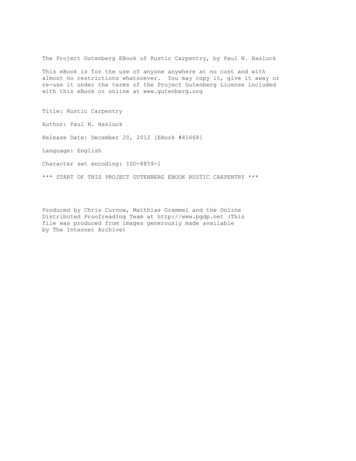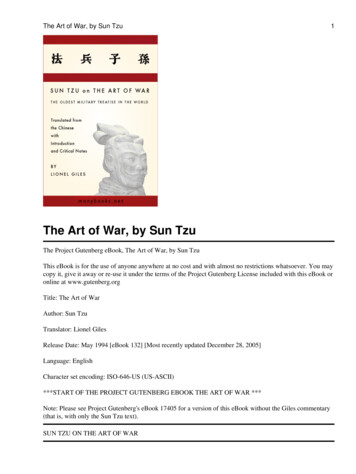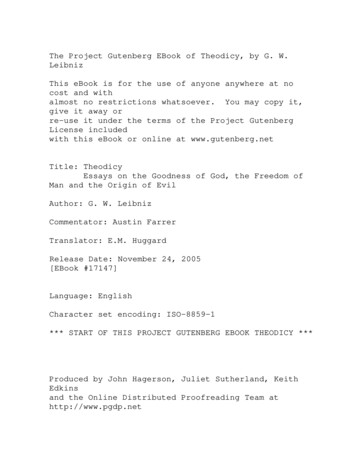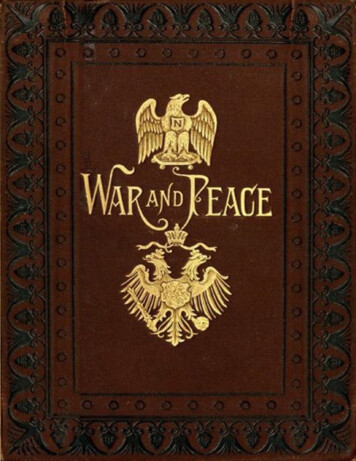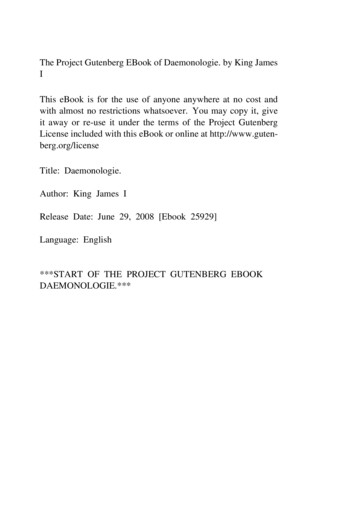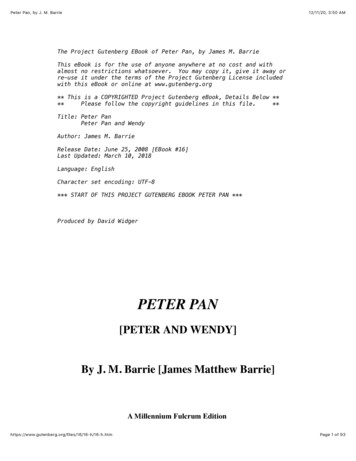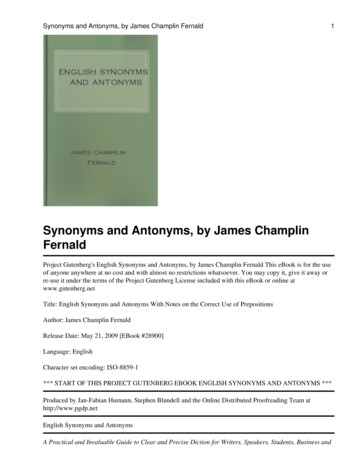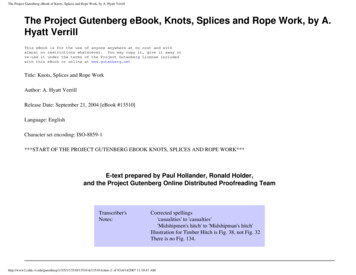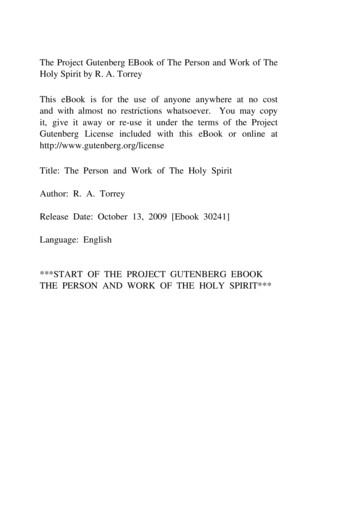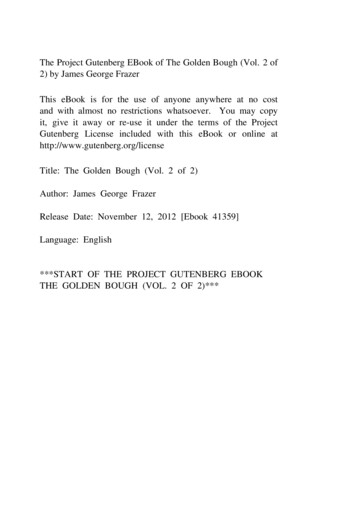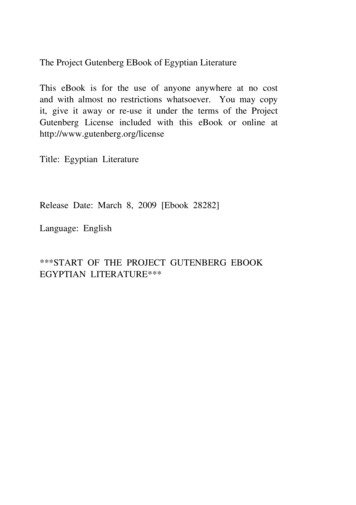
Transcription
The Project Gutenberg EBook of Egyptian LiteratureThis eBook is for the use of anyone anywhere at no costand with almost no restrictions whatsoever. You may copyit, give it away or re-use it under the terms of the ProjectGutenberg License included with this eBook or online athttp://www.gutenberg.org/licenseTitle: Egyptian LiteratureRelease Date: March 8, 2009 [Ebook 28282]Language: English***START OF THE PROJECT GUTENBERG EBOOKEGYPTIAN LITERATURE***
Egyptian LiteratureComprisingEgyptian Tales,Hymns, Litanies, Invocations,The Book Of The Dead,AndCuneiform WritingsEdited And With A Special Introduction ByEpiphanius Wilson, A.M.New York And LondonThe Co-Operative Publication SocietyCopyright, 1901The Colonial Press
ContentsSpecial Introduction. . . . . . . . . . . . . . . . . . .The Book Of The Dead . . . . . . . . . . . . . . . . .A Hymn To The Setting Sun . . . . . . . . . . . .Hymn And Litany To Osiris . . . . . . . . . . . .Litany . . . . . . . . . . . . . . . . . . . . . . . .Hymn To R . . . . . . . . . . . . . . . . . . . . .Hymn To The Setting Sun . . . . . . . . . . . . .Hymn To The Setting Sun . . . . . . . . . . . . .The Chapter Of The Chaplet Of Victory . . . . . .The Chapter Of The Victory Over Enemies. . . . .The Chapter Of Giving A Mouth To The Overseer .The Chapter Of Giving A Mouth To Osiris Ani . .Opening The Mouth Of Osiris . . . . . . . . . . .The Chapter Of Bringing Charms To Osiris . . . .The Chapter Of Memory . . . . . . . . . . . . . .The Chapter Of Giving A Heart To Osiris . . . . .The Chapter Of Preserving The Heart . . . . . . .The Chapter Of Preserving The Heart . . . . . . .The Chapter Of Preserving The Heart . . . . . . .The Chapter Of Preserving The Heart . . . . . . .The Heart Of Carnelian . . . . . . . . . . . . . . .Preserving The Heart . . . . . . . . . . . . . . . .Preserving The Heart . . . . . . . . . . . . . . . .Preserving The Heart . . . . . . . . . . . . . . . .Rubric . . . . . . . . . . . . . . . . . . . . . . . .Beating Back The Crocodile . . . . . . . . . . . .Beating Back The Crocodile . . . . . . . . . . . .Repulsing Serpents . . . . . . . . . . . . . . . . .Against Snakes . . . . . . . . . . . . . . . . . . 3838
ivEgyptian LiteratureAgainst Serpents . . . . . . . . . .Driving Away Apshait . . . . . . .Driving Back The Merti . . . . . . .Living By Air . . . . . . . . . . . .Living By Air . . . . . . . . . . . .Driving Back Rerek . . . . . . . . .Repulsing The Eater Of The Ass . .Abolishing The Slaughterings . . .Abolishing The Slaughterings . . .Air And Water . . . . . . . . . . . .Dominion Over Elements . . . . . .Dominion Over Elements . . . . . .Dominion Over Elements . . . . . .Preservation Of The Soul . . . . . .Of Drinking Water . . . . . . . . .Of Drinking Water . . . . . . . . .Preservation From Scalding . . . . .On Coming Forth By Day . . . . . .Chapter Of Knowledge . . . . . . .Of Gaining Mastery Over Enemies .Victory Over Enemies . . . . . . . .Coming Forth By Day . . . . . . . .Opening The Underworld . . . . . .Coming Forth By Day . . . . . . . .Coming Forth By Day . . . . . . . .Coming Forth By Day . . . . . . . .Coming Forth By Day . . . . . . . .Coming Forth By Day . . . . . . . .Of Lifting Up The Feet . . . . . . .Of Journeying To Annu . . . . . . .Of Transformation . . . . . . . . .Of Performing Transformations . . .Of Transformation Into A Hawk . .Of Transformation Into A 364646566686871727374747580
vOf Transformation Into A God . . . .Transformation Into A Lotus . . . . .Transformation Into A Lotus . . . . .Transformation Into Ptah . . . . . . .Transformation Into A Bennu Bird . .Transformation Into A Heron . . . . .Of The Living Soul . . . . . . . . . .Of The Swallow . . . . . . . . . . . .The Serpent Sata . . . . . . . . . . .Of The Crocodile . . . . . . . . . . .Soul And Body . . . . . . . . . . . .Of Evil Recollections . . . . . . . . .Of Rescue . . . . . . . . . . . . . . .Of Opening The Tomb . . . . . . . .Of Not Sailing To The East . . . . . .Of The Ink-Pot And Palette . . . . . .Of Being Nigh Unto Thoth . . . . . .Of Being Nigh Unto Thoth . . . . . .Of Bringing A Boat Along In HeavenOf Bringing The Makhent Boat . . . .Of Entering The Boat Of Ra . . . . .Of Protecting The Boat Of Ra . . . .Of Going Into The Boat Of Ra . . . .Of Knowing The Souls Of The East .Of Sekhet-Hetepet . . . . . . . . . . .Of Knowing The Souls Of Pe . . . . .Of Knowing The Souls Of Nekhen . .Of Knowing The Souls Of KhemennuOf Coming Forth From Heaven . . . .Of Knowing The Souls Of KhemennuOf Receiving Paths . . . . . . . . . .Of Coming Forth From Re-Stau . . .Of Coming Forth From Re-Stau . . .Of Going About In The Underworld 106107112113114115116117118118119
viEgyptian LiteratureOf Entering Into The Great House . . . .Of Entering The Presence . . . . . . . . .The Introduction To Maati . . . . . . . .The Introduction To Maati . . . . . . . .The Negative Confession . . . . . . . . .Address To The Gods Of The UnderworldOf The Hour Apes . . . . . . . . . . . . .Of The Praise Of The Gods . . . . . . . .Adoration Of The Gods Of The Qerti . . .Hymn Of Praise To Osiris . . . . . . . . .Of Making Perfect The Khu . . . . . . .Of Living Nigh Unto Ra . . . . . . . . .Of Bringing Men Back To Earth . . . . .Of Making Perfect The Khu . . . . . . .Of Making Perfect The Khu . . . . . . .For The New Moon . . . . . . . . . . . .Of Travelling In The Boat Of Ra . . . . .Of Making Perfect The Khu . . . . . . .Sailing In The Great Boat . . . . . . . . .Of The Four Flames . . . . . . . . . . . .Egyptian Tales . . . . . . . . . . . . . . . .The Taking Of Joppa . . . . . . . . . . .The Doomed Prince . . . . . . . . . . . .Anpu And Bata . . . . . . . . . . . . . .Setna And The Magic Book . . . . . . . .Tales Of The Magicians . . . . . . . . . .The Peasant And The Workman . . . . .The Shipwrecked Sailor . . . . . . . . . .The Adventures Of Sanehat . . . . . . . .The Tell Amarna Tablets . . . . . . . . . . .The Hittite Invasion Of Damascus . . . .The Amorite Treachery . . . . . . . . . .The War In Phœnicia . . . . . . . . . . .Northern Palestine . . . . . . . . . . . . 278
viiSouthern Palestine . . . . . . . . . . . . . . . . . . . . 291Royal Letters . . . . . . . . . . . . . . . . . . . . . . 322Cuneiform Inscriptions And Hieratic Papyri . . . . . . . . 361The Great Tablet Of Rameses II At Abu-Simbel . . . . 361Hymn To Osiris . . . . . . . . . . . . . . . . . . . . . 368Travels Of An Egyptian In The Fourteenth Century B.C.374Dirge Of Menephtah . . . . . . . . . . . . . . . . . . 382Hymn To The Nile . . . . . . . . . . . . . . . . . . . 384The Solemn Festal Dirge Of The Egyptians . . . . . . 392Hymns To Amen . . . . . . . . . . . . . . . . . . . . 395Hymn To Pharaoh . . . . . . . . . . . . . . . . . . . . 398The Song Of The Harper . . . . . . . . . . . . . . . . 399Hymn To Amen-Ra . . . . . . . . . . . . . . . . . . . 403Hymn To Ra-Harmachis . . . . . . . . . . . . . . . . 411The Lamentations Of Isis And Nephthys . . . . . . . . 415The Litany Of Ra . . . . . . . . . . . . . . . . . . . . 423The Book Of Respirations . . . . . . . . . . . . . . . 444The Epic Of Penta-Our . . . . . . . . . . . . . . . . . . . 454Footnotes . . . . . . . . . . . . . . . . . . . . . . . . . . 461
[iii]
Special Introduction.The wonders of Egyptian archæology are the latest and mostprecious harvest of scholars and explorers. From Belzoni toFlinders Petrie there has been a succession of discoveries in thevalley of the Nile with which it is hard for ordinary students tokeep pace. Our knowledge of Egyptian life to-day is far clearerand more complete than Bentley's or Porson's acquaintance withthe antiquities of Greece and Rome, and we have far morecomplete access to the treasures of Egyptian literature thanDante or Thomas Aquinas had to the remains of Attic poetsand mystics. We know exactly how an Egyptian of the twelfthdynasty dressed; what was the position of women in Egypt; andwhat uniform was worn by the Egyptian soldiers who took partin the campaign against Khitasis. We can see Rameses II ridingin his war-chariot; we know the very names of the horses bywhose side his tame lion is running and thirsting for the bloodof his master's foes. We know all about the domestic animals,the funeral customs, the trades, the gods, the agriculture of theNile valley thirty centuries ago. We see the whole many-sidedcivilization portrayed in the brightest colors in the poetry, thebooks of ritual, the hieratic inscriptions, the tablets, papyri, andhieroglyphics which day by day come to light in exhaustlessabundance from the mounds and ruins of that fertile plain thatstretches from Thebes to the Mareotic lake.For instance, we can learn exact particulars about the modein which Rameses II made war, from the poem of Penta-Our, aTheban writer of the fourteenth century B.C. It is only by a figureof speech that this poem can be called an epic; it is rather ahistorical narrative couched in terms of poetic exaggeration withthe object of flattering the royal vanity of Pharaoh.
Special Introduction.3The campaign in which Rameses then engaged was directedagainst Kadesh, a city built on an island in the Orontes. It is,according to Penta-Our, inhabited by a people known as Khita,whose spies are brought into the tent of Rameses and questionedas to the whereabouts of the King of Kadesh. The spies areforced by blows to answer, and they tell the Egyptian monarchthat the King of the Khita “is powerful with many soldiers, andwith chariot soldiers, and with their harness, as many as the sandof the seashore, and they are ready to fight behind Kadesh.”The King is very angry; for he had been deceived by falsenews to the effect that his enemy had fled in terror to Khilibu.“The fault is great,” he cries, “that the governors of the land andthe vassal princes of Pharaoh have committed, in neglecting towatch the movements of the Khita.” He sends to bring back thelegions he had sent away, and meanwhile the approach of theenemy is announced. The camp of Rameses is surprised by theAsiatics; many foot-soldiers are killed before they can seize theirweapons, but a faithful band rallies in front of the royal quarters.Suddenly a cry is heard; Rameses has quickly put on his armor,seized his lance, ordered his war lion to be loosed, and dashedinto the fight. Pharaoh with his master of the horse, Menni, issoon hemmed in by foes. “My Lord, O generous King!” criesMenni, “Egypt's great protector in the day of battle! beholdwe stand alone in the midst of the enemy, for the archers andthe chariots have left us. Let us return, that our lives may besaved. Save us, O my Lord, Rameses Miamun!” Then Ramesescalled upon Amen, his god, and under his protection chargedthe enemy, and “his hand devoured them in the space of aninstant.” Five times he rushed upon them, and five times theyrepulsed him. The sixth time he breaks their ranks and regainshis own lines. Then the legions of Ptah, which had returned tothe camp, join the battle, and the Asiatics are routed. The firstcare of Rameses is to refresh his brave horses, Victory-in-Thebesand Maut-is-Satisfied. Neither they nor Rameses and his lion[iv]
4[v]Egyptian Literatureare wounded, though all stained with blood and dust, while thehead-plumes of the team are torn and tattered and their caparisonbroken.This is a brief account of the main incident in this Egyptianepic, which is written with life-like detail and animation. Thewar concludes with a treaty, and the marriage of Rameses withthe daughter of the King of Kadesh, so that henceforth “thepeople of Egypt were of one mind with the princes of Khita,which had not been the case since the god R .”The Egyptians have always been deeply impressed by thefact of human mortality, and much of their religious belief andreligious ritual is taken up with the rites of burial, and detaileddoctrines as to the experience of the soul after parting from thebody. Their elaborate embalming of the dead springs from thedesire to keep the mortal tenement prepared for the soul's returnto it. In their Book of the Dead is a full series of prayers, songs,and incantations to be employed at funerals, and by the individualin his journey beyond the tomb. The funeral procession was avery noisy company; lamentations were heard through its wholelength, but the burden of the hymns was always, “To the West.”This was enlarged upon, “To the West, the dwelling of Osiris; OChief, as thou goest to the West, the Gods themselves lament, asthou goest to the West.”Osiris is the judge who weighs the souls, and allots themhappiness or misery, according to their deserts. “The Bookof the Dead” is interesting because it teaches how clearly anddogmatically the solemn and precise Egyptian stated his viewsand held his convictions concerning the unknown country. Fourparts of man, it was said, survive after death, namely, the soul,the spirit, the shadow, and the double. The double remains in thetomb, and only leaves it in search of food. Sometimes it feelsits loneliness and avenges itself upon near relations who haveforsaken it. But the soul hurries to the bar of Osiris, where Thothweighs the heart in the scales, and the innocent are admitted
Special Introduction.5into the Field of Beans, a realm of fertility, where wheat growsseven cubits high. Immortality is spent in feasting, singing,conversation, and games. But the whole of this wonderful bookis well worth studying. It shows how what Addison calls “thislonging after immortality” led an ancient and deeply religiouspeople to attempt in their burial rites to rob even the grave of itsterrors, and conjured up out of the shadows of the tomb a clearand distinct vision of future life, wherein man in his completeindividuality survived to all eternity.Among the most important results of recent Egyptianexploration must be reckoned the discovery of the tablets ofTell Amarna. Tell Amarna is a village in Upper Egypt, andin a pit at the foot of the mountain, at the base of which itstands, were discovered hundreds of these relics, which havesince been distributed among the museums of London, Berlin,and Gizeh. The writing on these tablets is cuneiform, and thematter is of profound historic importance, illustrating, as it does,the relations between Egypt and western Asia in the fifteenthcentury B.C. While the existence of these tablets proves thatcuneiform writing was common to Palestine and Syria as well asthe Euphrates Valley, yet curiously enough the manuscripts ofTell Amarna are different from any of the same kind that havebeen found elsewhere, and the language resembles somewhat theHebrew of the Old Testament.While most of these tablets are letters and despatches fromfriendly powers in Syria, and from vassal princes in Palestine,others contain interesting legends. The letters are addressed tothe Pharaohs known as Amenophis III and Amenophis IV, whoreigned in the sixteenth and fifteenth centuries B.C.The Egyptians employed what practically were threealphabets—the hieroglyphic, the hieratic, and the demotic. Thehieroglyph is a symbol, denoting something without letters orsyllables; as, pictures of a bee stand for king. The hieratichandwriting was a transition from symbols to primitive letters;[vi]
6Egyptian Literaturethe papyrus reed, cut in slices and gummed together, was usedas paper for this writing, much of which is very beautifullyexecuted in black and red inks. These papyri are constantly beingdiscovered, but perhaps the earliest “find” of importance wasthat at Thebes in 1846, when a number of literary compositionswere brought to light which must have been executed during thetwelfth dynasty, about twenty-five centuries B.C.The Egyptian Tales are works written in a lighter vein thanthe literature we have already described. They will be readwith delight, and none the less so because they show that theEgyptians, who are the Chinese of the Mediterranean, possessthat saving quality in literary and political life, namely, a senseof humor.(signed) Epiphanius Wilson[001]
The Book Of The DeadAccording to the Theban RecensionTranslated by E. A. Wallis Budge, Litt.D.,D.Lit., F.S.A.[003]A Hymn To The Setting SunA HYMNOFPRAISETORAWHEN HE RISETH UPON THE HORIZON,AND WHEN HE SETTETH IN THE LAND OF LIFE.Osiris, the scribe Ani,saith:“Homage to thee, O R , when thou risest [as] Tem-Heru-khuti(Tem-Harmachis). Thou art adored [by me when] thy beautiesare before mine eyes, and [when thy] radiance [falleth] upon[my] body. Thou goest forth to thy setting in the Sektet boat with[fair] winds, and thy heart is glad; the heart of the M tet boatrejoiceth. Thou stridest over the heavens in peace, and all thyfoes are cast down; the never-resting stars sing hymns of praiseunto thee, and the stars which rest, and the stars which never failglorify thee as thou sinkest to rest in the horizon of Manu,1 O1I.e., the mountain of sunset.
8[004]Egyptian Literaturethou who art beautiful at morn and at eve, O thou lord who livestand art established, O my lord!“Homage to thee, O thou who art R when thou risest, andTem when thou settest [in] beauty. Thou risest and shinest onthe back of thy mother [Nut], O thou who art crowned kingof the gods! Nut doeth homage unto thee, and everlasting andnever-changing order2 embraceth thee at morn and at eve. Thoustridest over the heaven, being glad of heart, and the Lake ofTestes is content [thereat]. The Sebau Fiend hath fallen to theground; his arms and his hands have been hacked off, and theknife hath severed the joints of his body. R hath a fair wind;the Sektet boat goeth forth and sailing along it cometh into port.The gods of the south and of the north, of the west and of theeast, praise thee, O thou divine substance, from whom all formsof life come into being. Thou sendest forth the word, and theearth is flooded with silence, O thou only One, who didst dwellin heaven before ever the earth and the mountains came intoexistence. O Runner, O Lord, O only One, thou maker of thingswhich are, thou hast fashioned the tongue of the company ofthe gods, thou hast produced whatsoever cometh forth from thewaters, and thou springest up from them over the flooded landof the Lake of Horus. Let me snuff the air which cometh forthfrom thy nostrils, and the north wind which cometh forth fromthy mother [Nut]. Oh, make thou to be glorious my shining form(khu), O Osiris, make thou to be divine my soul (ba)! Thou artworshipped [in] peace (or [in] setting), O lord of the gods, thouart exalted by reason of thy wondrous works. Shine thou withthy rays of light upon my body day by day, [upon me], Osiristhe scribe, the teller of the divine offerings of all the gods, theoverseer of the granary of the lords of Abtu (Abydos), the royalscribe in truth who loveth thee; Ani, victorious in peace.”2I.e., Ma t.
Litany9Hymn And Litany To Osiris[From the Papyrus of Ani (British Museum No. 10,470, sheet19).]“Praise be unto thee, O Osiris, lord of eternity, Unnefer,Heru-khuti (Harmachis), whose forms are manifold, and whoseattributes are majestic, Ptah-Seker-Tem in Annu (Heliopolis),the lord of the hidden place, and the creator of Het-ka-Ptah(Memphis) and of the gods [therein], the guide of the underworld,whom [the gods] glorify when thou settest in Nut. Isis embraceththee in peace, and she driveth away the fiends from the mouth ofthy paths. Thou turnest thy face upon Amentet, and thou makestthe earth to shine as with refined copper. Those who have laindown (i.e., the dead) rise up to see thee, they breathe the air andthey look upon thy face when the Disk riseth on its horizon; theirhearts are at peace inasmuch as they behold thee, O thou who artEternity and Everlastingness!”[005]Litany“Homage to thee, [O lord of] starry deities in Annu, and ofheavenly beings in Kher- ba; thou god Unti, who art moreglorious than the gods who are hidden in Annu; oh grant3 thouunto me a path whereon I may pass in peace, for I am just and3The following petition, “Oh, grant thou unto me a path,” etc., is writtenonce only, and at the end of the Litany, but I think it is clear that it was intendedto be repeated after each of the nine addresses. This is proved by the Sa teRecension (see Lepsius, op. cit, Bl. 5) where the words, “Grant thou the sweetbreath of the north wind to the Osiris Auf- nkh,” are written in two places andare intended to be said after each of the ten addresses above them.
10[006]Egyptian Literaturetrue; I have not spoken lies wittingly, nor have I done aught withdeceit.”“Homage to thee, O An in Antes, (?) Heru-khuti (Harmachis),with long strides thou stridest over heaven, O Heru-khuti. Oh,grant thou unto me a path whereon I may pass in peace, for I amjust and true; I have not spoken lies wittingly, nor have I doneaught with deceit.”“Homage to thee, O Soul of everlastingness, thou Soul whodwellest in Tattu, Unnefer, son of Nut; thou art lord of Akert.Oh, grant thou unto me a path wherein I may pass in peace, forI am just and true; I have not spoken lies wittingly, nor have Idone aught with deceit.”“Homage to thee in thy dominion over Tattu; the Ureret crownis established upon thy head; thou art the One who maketh thestrength which protecteth himself, and thou dwellest in peace inTattu. Oh, grant thou unto me a path whereon I may pass inpeace, for I am just and true; I have not spoken lies wittingly,nor have I done aught with deceit.”“Homage to thee, O lord of the Acacia tree, the Seker boat isset upon its sledge; thou turnest back the Fiend, the worker ofevil, and thou causest the Utchat to rest upon its seat. Oh, grantthou unto me a path whereon I may pass in peace, for I am justand true; I have not spoken lies wittingly, nor have I done aughtwith deceit.”“Homage to thee, O thou who art mighty in thine hour, thougreat and mighty Prince, dweller in An-rut-f,4 lord of eternityand creator of everlastingness, thou art the lord of Suten-henen(Heracleopolis Magna). Oh, grant thou unto me a path whereonI may pass in peace, for I am just and true; I have not spoken lieswittingly, nor have I done aught with deceit.”“Homage to thee, O thou who restest upon Right and Truth,thou art the lord of Abtu (Abydos), and thy limbs are joined unto4I.e., “the place where nothing groweth,” the name of a district in theunderworld.
Hymn To R11Ta-tchesertet; thou art he to whom fraud and guile are hateful.Oh, grant thou unto me a path whereon I may pass in peace, forI am just and true; I have not spoken lies wittingly, nor have Idone aught with deceit.”“Homage to thee, O thou who art within thy boat, thou bringestH pi (i.e., the Nile) forth from his source; the light shineth uponthy body and thou art the dweller in Nekhen.5 Oh, grant thouunto me a path whereon I may pass in peace, for I am just andtrue; I have not spoken lies wittingly, nor have I done aught withdeceit.”“Homage to thee, O creator of the gods, thou King of theNorth and of the South, O Osiris, victorious one, ruler of theworld in thy gracious seasons; thou art the lord of the celestialworld.6 Oh, grant thou unto me a path whereon I may pass inpeace, for I am just and true; I have not spoken lies wittingly,nor have I done aught with deceit.”Hymn To R[From the Papyrus of Ani (British Museum No. 10,470, sheet20).]A HYMN OF PRAISE TO R WHEN HE RISETH IN THE EASTERN PARTOF HEAVEN. Those who are in his train rejoice, and lo! Osiris Ani,victorious, saith:“Hail, thou Disk, thou lord of rays, who risest on the horizonday by day! Shine thou with thy beams of light upon the faceof Osiris Ani, who is victorious; for he singeth hymns of praiseunto thee at dawn, and he maketh thee to set at eventide with5The name of the sanctuary of the goddess Nekhebet in Upper Egypt, theEileithyiapolis of the Greeks.6I.e., the two lands Atebui, which were situated one on each side of thecelestial Nile.
12[007]Egyptian Literaturewords of adoration. May the soul of Osiris Ani, the triumphantone, come forth with thee into heaven, may he go forth in theM tet boat. May he come into port in the Sektet boat, and mayhe cleave his path among the never-resting stars in the heavens.”Osiris Ani, being in peace and in triumph, adoreth his lord,the lord of eternity, saying: “Homage to thee, O Heru-khuti(Harmachis), who art the god Khepera, the self-created; whenthou risest on the horizon and sheddest thy beams of light uponthe lands of the North and of the South, thou art beautiful, yeabeautiful, and all the gods rejoice when they behold thee, theKing of heaven. The goddess Nebt-Unnut is stablished upon thyhead; and her uræi of the South and of the North are upon thybrow; she taketh up her place before thee. The god Thoth isstablished in the bows of thy boat to destroy utterly all thy foes.Those who are in the Tuat (underworld) come forth to meet thee,and they bow in homage as they come toward thee, to behold[thy] beautiful Image. And I have come before thee that I maybe with thee to behold thy Disk every day. May I not be shut upin [the tomb], may I not be turned back, may the limbs of mybody be made new again when I view thy beauties, even as [arethose of] all thy favored ones, because I am one of those whoworshipped thee [whilst I lived] upon earth. May I come in untothe land of eternity, may I come even unto the everlasting land,for behold, O my lord, this hast thou ordained for me.”And lo, Osiris Ani triumphant in peace, the triumphant one,saith: “Homage to thee, O thou who risest in thy horizon asR , thou reposest upon law [which changeth not nor can it bealtered]. Thou passest over the sky, and every face watcheth theeand thy course, for thou hast been hidden from their gaze. Thoudost shew thyself at dawn and at eventide day by day. The Sektetboat, wherein is thy Majesty, goeth forth with might; thy beams[shine] upon [all] faces; [the number] of thy red and yellow rayscannot be known, nor can thy bright beams be told. The lands of
Hymn To R13the gods, and the eastern lands of Punt7 must be seen, ere thatwhich is hidden [in thee] may be measured. Alone and by thyselfthou dost manifest thyself [when] thou comest into being aboveNu (i.e., the sky). May Ani advance, even as thou dost advance;may he never cease [to go forward], even as thy Majesty ceasethnot [to go forward], even though it be for a moment; for withstrides dost thou in one little moment pass over the spaces whichwould need hundreds of thousands and millions of years [forman to pass over; this] thou doest, and then dost thou sink torest. Thou puttest an end to the hours of the night, and thou dostcount them, even thou; thou endest them in thine own appointedseason, and the earth becometh light. Thou settest thyself beforethy handiwork in the likeness of R ; thou risest in the horizon.”Osiris, the scribe Ani, triumphant, declareth his praise of theewhen thou shinest, and when thou risest at dawn he crieth inhis joy at thy birth: “Thou art crowned with the majesty of thybeauties; thou mouldest thy limbs as thou dost advance, and thoubringest them forth without birth-pangs in the form of R , as thoudost rise up into the upper air. Grant thou that I may come untothe heaven which is everlasting, and unto the mountain wheredwell thy favored ones. May I be joined unto those shiningbeings, holy and perfect, who are in the underworld; and may Icome forth with them to behold thy beauties when thou shinestat eventide and goest to thy mother Nu. Thou dost place thyselfin the west, and my two hands are [raised] in adoration [of thee]when thou settest as a living being. Behold, thou art the maker ofeternity, and thou art adored [when] thou settest in the heavens.I have given my heart unto thee without wavering, O thou whoart mightier than the gods.”Osiris Ani, triumphant, saith: “A hymn of praise to thee, Othou who risest like unto gold, and who dost flood the worldwith light on the day of thy birth. Thy mother giveth thee birth7I.e., the land on each side of the Red Sea and on the coast of Africa.[008]
14[009]Egyptian Literatureupon [her] hand, and thou dost give light unto the course of theDisk. O thou great Light, who shinest in the heavens, thou doststrengthen the generations of men with the Nile-flood, and thoudost cause gladness in all lands, and in all cities, and in all thetemples. Thou art glorious by reason of thy splendors, and thoumakest strong thy ka (i.e., Double) with hu and tchefau foods.O thou who art the mighty one of victories, thou who art thePower of [all] powers, who dost make strong thy throne againstevil fiends; who art glorious in majesty in the Sektet boat, andwho art exceeding mighty in the Atet boat, make thou gloriousOsiris Ani with victory in the underworld; grant thou that in thenetherworld he may be without evil. I pray thee to put away[his] faults behind thee: grant thou that he may be one of thyvenerable
Mar 08, 2009 · happiness or misery, according to their deserts. “The Book of the Dead” is interesting because it teaches how clearly and dogmatically the solemn and precise Egyptian stated his views and held his convictions concerning the unknown country. Four parts of man, it was said, survive after death, namely, the soul, the spirit, the shadow, and .
